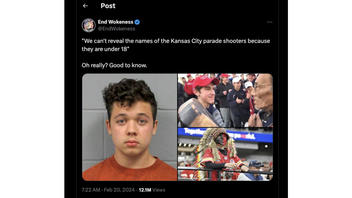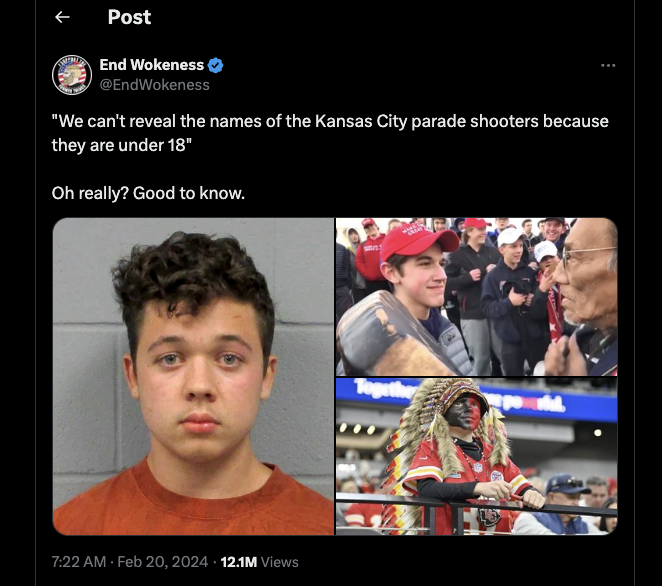
Could law enforcement and prosecutors have chosen not to release Kyle Rittenhouse's name? No, that's not true: Wisconsin, where he was charged at age 17 and later acquitted after the trial over the killing of two, is one of the states that requires persons in this age group to be treated as adults in criminal cases. Other states extend identity protection for juveniles beyond that age.
The claim appeared in a post (archived here) on X on February 20, 2024. It began:
'We can't reveal the names of the Kansas City parade shooters because they are under 18. Oh really?
'Good to know.
This is what the post looked like at the time of writing:
The entry on X showed a photo of Rittenhouse in an orange T-shirt. Comparing his case (archived here) with the February 14, 2024, Kansas City Super Bowl parade shooting, his post implied that law enforcement could have avoided releasing Rittenhouse's name.
On February 20, 2024, the Kansas City Police Department released (archived here) the names of two men described by law enforcement as adult suspected shooters.
That followed a previous update on the investigation announcing that two juveniles (archived here) had also been charged in connection with the Super Bowl parade shooting. A circuit court news release (archived here) on February 16, 2024, said the two juveniles were being held "on gun related and resisting arrest charges." The two juveniles were not charged with shooting anyone.
The New York Times (archived here) reported that the two adult suspects whose names were released were 23 and 18 years old.
On the day when the post on X was published, Rittenhouse said (archived here) on X that he was "trying to comprehend why the government was quick to reveal" his name.
The fact is that state laws regulating the prosecution of minors vary across the country.
Rittenhouse was charged in Wisconsin. Wisconsin state law (archived here) explicitly says that 17-year-olds are considered adults in the criminal justice system, meaning that identity protections typically reserved for minors are not applicable in such cases:
'Adult' means a person who is 18 years of age or older, except that for purposes of investigating or prosecuting a person who is alleged to have violated any state or federal criminal law or any civil law or municipal ordinance, 'adult' means a person who has attained 17 years of age.
... 'juvenile' does not include a person who has attained 17 years of age.
This act provides that, unless the child is certified as an adult or is being prosecuted for a traffic or curfew violation, children who are 17 years of age must be prosecuted in the juvenile court system.


















